On a busy stretch of I-35 in Denton, Texas, the local Buc-ee’s is hard to miss.
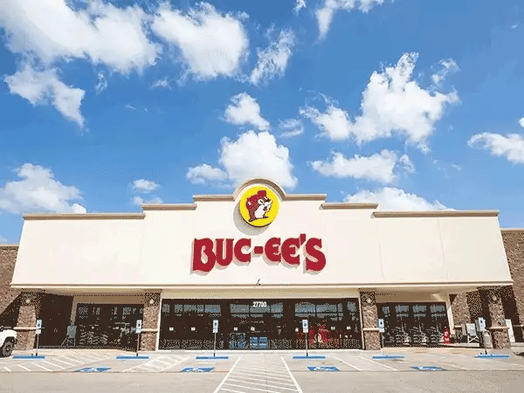
The gas station announces its presence on a giant billboard featuring a beaver mascot, and a green highway sign beckons drivers to exit at “Buc-ee’s Blvd.” Just off the road, there it is: a 50k-square-foot convenience store outfitted with a 250-foot car wash, enough gas pumps to cover the length of a football field, and a human-size beaver statue.
Founded in 1982, the Texas-based chain lives up to the state’s “everything is bigger here” mantra. The Denton store is not even its largest. The company’s 66k-square-foot location in New Braunfels has:
- 1k parking spots
- 120 fuel pumps
- 83 toilets
- 80 soda dispensers
- 64 ice freezers
- 31 cash registers
Buc-ee’s — which has 46 locations, mostly in Texas — is renowned for its massive sales (an estimated eight figures annually, per store) and sparkling-clean restrooms. Loyal customers are willing to travel an average of 21 minutes just to go to one.
But none of this is as impressive as the mammoth array of Buc-ee’s-branded snacks and merchandise inside of its stores.
Buc-ee’s signature lemon crisps, beef jerky, BBQ sauce, and “Beaver Nuggets” have earned the chain a cult following. There are dozens of groups on Facebook — some with tens of thousands of members — that are entirely devoted to Buc-ee’s snacks.
There’s just one problem: If you’re a fan of these treats, getting them isn’t always easy. Buc-ee’s stores are typically in remote locations, and the chain doesn’t have an online store.
So, one Buc-ee’s fan decided to take matters into his own hands.
“I’m maniacally curious”
Chris Koerner is the kind of guy who needs a spreadsheet to keep track of all the businesses he’s created.
He first got bit by the entrepreneur bug at the age of eight.
“I grew up kind of broke in Utah, but I lived across from the 18th hole of a golf course and golfers used to hit balls into our front yard,” Koerner told The Hustle. “I collected them and sold them — three for $1.”
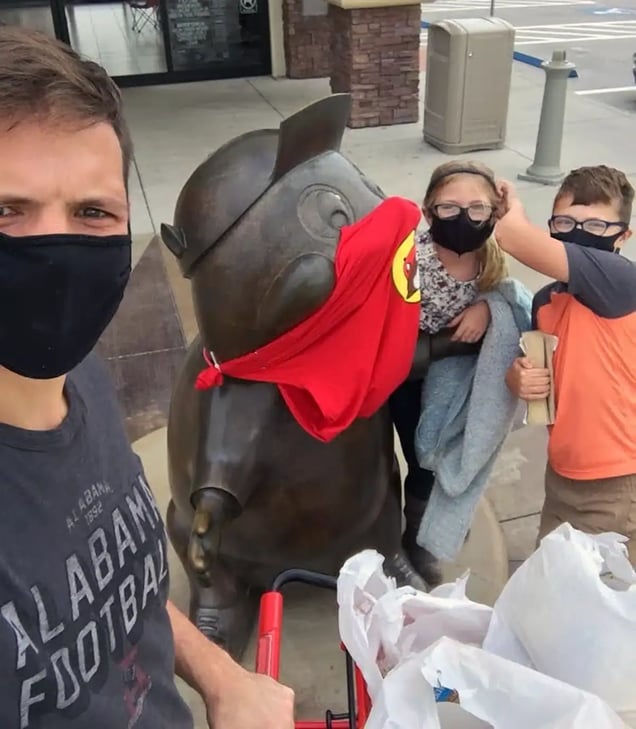
Chris Koerner, left, outside of a Buc-ee’s with his kids (courtesy of Chris Koerner)
Koerner went on to get a degree in business management from the University of Alabama in 2011. Over the next decade, he launched (and sold) a number of companies, including:
- One of America’s first chains of smartphone repair shops
- A company that distributed wholesale parts to those same repair shops (and recycled broken iPhone screens)
- A real estate firm that bought and sold more than 20 mobile home parks
In late 2019, he connected with a friend who owned a bread company that exclusively sold to physical retail stores around the Dallas-Fort Worth area. This friend was doing pretty well for himself, with sales of ~15k loaves per week. But Koerner saw untapped potential.
“My friend is a boomer who didn’t really care about online sales. So I suggested putting a QR code in each bag that said, ‘Buy us online,’” says Koerner.
Koerner, who calls himself “maniacally curious,” set up a website along with a logistics pipeline, and integrated his idea free of charge. Sales exploded. And when the pandemic hit a few months later, online sales ended up saving the business.
“I thought, ‘There are so many boomer-owned food businesses that don’t sell online, but could and should.’”
Koerner’s realization led him to start a venture called Send Eats — a third-party logistics company (3PL) that helps old-school businesses set up and run ecommerce stores for their products.
And it wouldn’t be long until he found a new client in a very unexpected place.
“Buc-ee’s doesn’t have an online store?!”
Like many Texas residents, Koerner had been in awe of Buc-ee’s from the first time he laid eyes on one of its massive stores.
“It is an absolutely crazy place. You drive by and see all these pumps, a weird beaver logo, and you’re like, ‘What is happening?’” he says. “You walk in, and it’s just a palace of stuff. They have a whole BBQ restaurant. A whole station making fresh fudge. A wall of jerky with dozens of flavors. A wall of candy. Then, you go to the bathroom and it’s like the Sistine Chapel in there.”
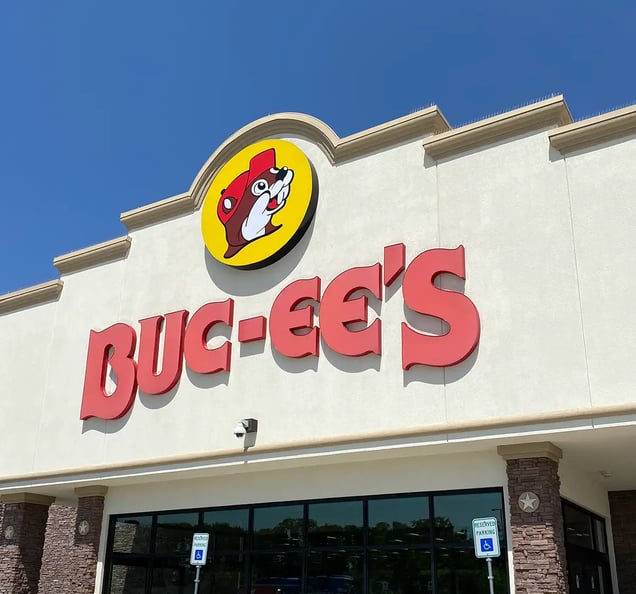
A Buc-ee’s in Denton, Texas (The Hustle)
Buc-ee’s carries all of the standard gas station treats — Doritos, Skittles, Pepsi. But it’s the Buc-ee’s-branded stuff that makes the chain stand out:
- Beaver Nuggets (puffy corn with a brown-sugar caramel coating)
- Over a dozen varieties of beef jerky — garlic, mesquite, ghost pepper, Korean BBQ
- Pickled quail eggs, beets, okra, and green beans
- Jams, jellies, butters, rubs, and sauces
- Nuts and trail mix
- Buc-ee’s-branded trucker hats, T-shirts, blankets, coolers, tumblers, camping gear, and even pool noodles
Most of these products are white label, meaning they’re purchased from anonymous third-party manufacturers and branded with the Buc-ee’s logo — the same strategy employed by stores like Trader Joe’s.
And for many fans, a trip down the chain’s treat-laden aisles is a quasi-spiritual Texas experience.
“Nobody ever forgets their first Buc-ee’s experience,” says Koerner. “It’s something you tell all of your friends about.”
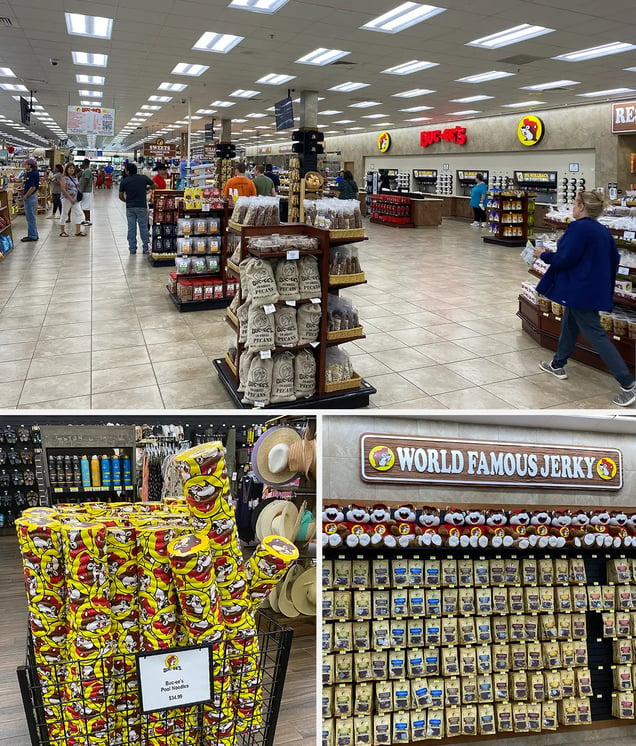
The walls at Buc-ee’s are lined with nuts, beaver-themed clothes, and more flavors of beef jerky than you could ever imagine (The Hustle)
In 2020, during the pandemic, Koerner was craving some of these Buc-ee’s treats and went to go check out their website.
What he found was… nothing.
“I was like, ‘Wait, what? Buc-ee’s doesn’t have an online store?’ It was like a lightbulb. There’s a huge opportunity here.”
By this point, Koerner already had his ecommerce logistics company set up and was helping other brands distribute products online. He emailed Buc-ee’s to ask if they’d be interested in a partnership.
“It was crickets,” he says. “So, I decided to do it myself.”
A rogue Buc-ee’s store
Koerner rounded up his wife and two kids and went to Buc-ee’s with a game plan: They’d buy one of every single Buc-ee’s item.
“The instruction was: Anything with a Buc-ee’s logo on it goes in the cart,” he recalls. “It was something like 650 items total — like six carts worth. The employees were very confused, and it took more than an hour to check out.”
His total bill: $1,470.97.
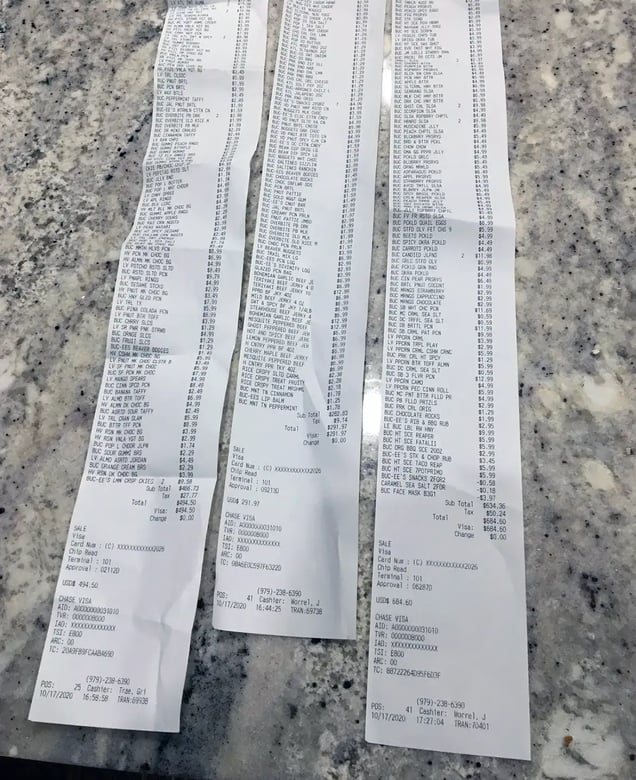
Koerner’s receipts from his inaugural Buc-ee’s trip (courtesy of Chris Koerner)
Koerner took his haul home and laid it all out in his living room. Then, he got to business:
- He hired a photographer to take a picture of every single item on a white backdrop (~$500)
- He registered the domain “BeaverSnax.com” and set up an ecommerce shop using Shopify ($10)
- He emailed a bunch of reporters to tell them about his master plan to start an online Buc-ee’s store
Almost immediately, Koerner got an email from a lawyer at Buc-ee’s.
For a moment, Koerner thought his plan was foiled before it even began. And he had reason to believe that was the case. Buc-ee’s has been known to be litigious in the past:
- In 2013, they filed a lawsuit against the convenience chain Chicks for allegedly copying its store layout.
- In 2014, they sued a competing convenience store chain for using a beaver-themed logo. It was settled out of court. A similar suit against a different chain ended in victory in 2016.
- In 2017, they sued a Nebraska-based chain called Bucky’s for attempting to expand into Texas. They won the turf war.
He also knew that similar efforts at other retailers had been thwarted in the past.
For years, a man named Mike Hallatt bought $1m+ worth of products at Trader Joe’s in Seattle and resold them at a markup in his own Canada store, called Pirate Joe’s. Trader Joe’s sued over copyright infringement. A five-year legal battle ensued, and Pirate Joe’s shut its doors for good in 2017.
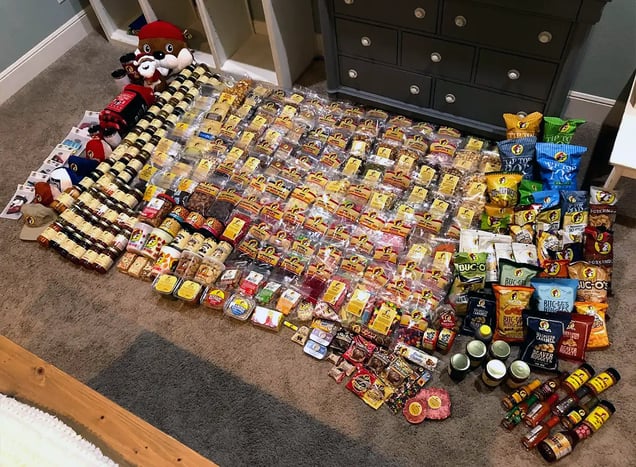
A part of the Buc-ee’s haul laid out in Koerner’s home (courtesy of Chris Koerner)
But to Koerner’s surprise, the Buc-ee’s lawyer was OK with his plan.
“He said, ‘We love what you’re doing. Just two things: One, change the name. Don’t use “Beaver.” And two, put a disclaimer on your website that you’re not Buc-ee’s.’”
As it turned out, Koerner was well within his legal rights to resell Buc-ee’s products on his own website. Under the so-called first-sale doctrine, anything can be resold, so long as they don’t pretend to be the original manufacturer. (Pirate Joe’s had just flown too close to the sun with its branding.)
Koerner changed his website to TexasSnax.com. And in November of 2020, he opened for business.
The venture was successful almost immediately: The first full month in business, Texas Snax did $161k in sales. And since then, it’s only gained more steam.
The Buc-ee’s resale market
Today, Texas Snax does $250k to $300k per month in sales, according to Koerner. The business works like so:
- Every week, he submits an order form to several Buc-ee’s stores.
- They organize the items and pack them onto a giant pallet.
- One of Koerner’s employees picks up the order and checks out at the register like any other customer.
- The items are loaded onto a box truck and taken to Koerner’s air-conditioned warehouse.
Texas Snax lists ~1.2k Buc-ee’s items on its website, along with seasonal products, like Fourth of July T-shirts. As is the case in-store, Beaver Nuggets are by far the best-seller.
Running this operation is logistically complex, and Koerner says he couldn’t do it without the help of his co-founder, Kirk Salisbury. “Kirk’s created Google Sheets that would make your grandma blush,” he says. “APIs from everywhere, all the sheets talk to each other, it’s all in sync.”
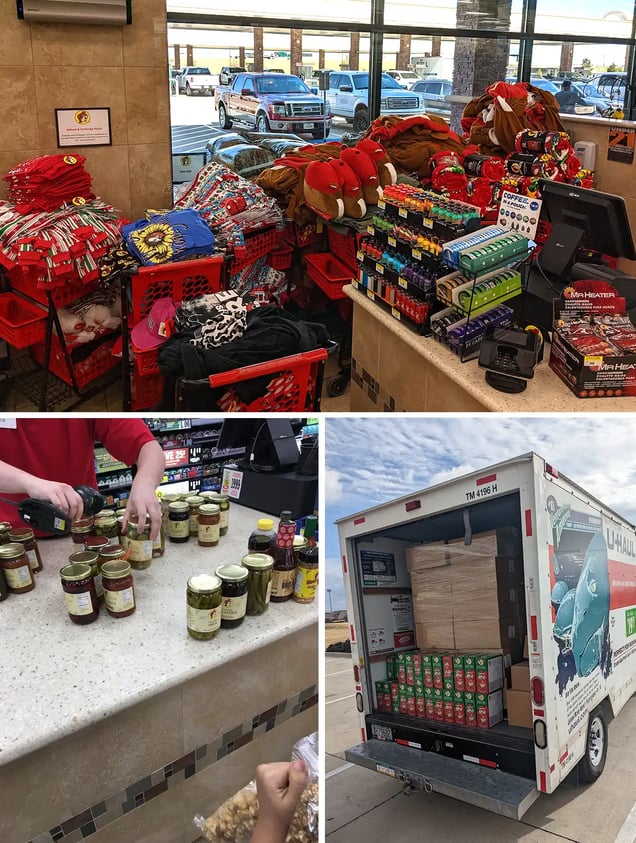
The loading process (via Chris Koerner)
Koerner pays full retail price for all the items he buys from Buc-ee’s and sells them at a markup on the website.
Customers, he says, are willing to pay more for the convenience of ordering online. Considerably more.
The Hustle visited a Buc-ee’s store in Denton, Texas (outside of Dallas) and compared the in-store prices on select items to the prices customers pay on TexasSnax. Among our sample, items appear to be marked up anywhere from 50% to 132%.
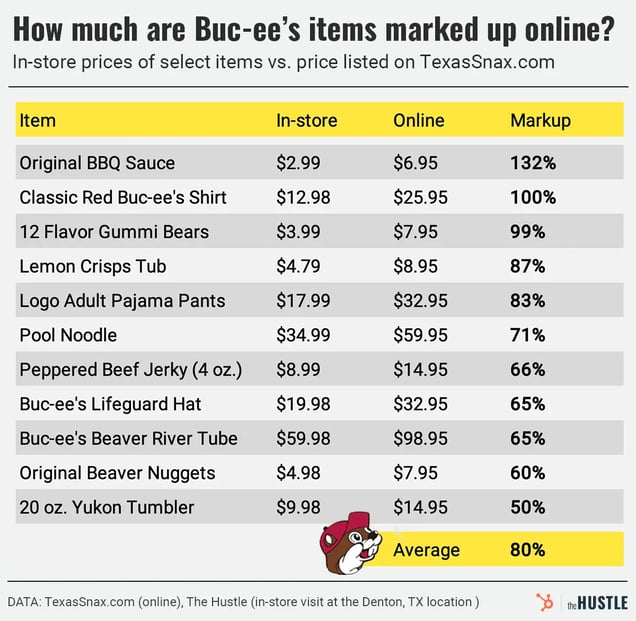
The Hustle
Koerner faces some competition — mainly on Amazon.
“Buc-ee’s put[s] a lot of their locations in the middle of nowhere. So you end up stopping there and never going there again,” says Koerner. “Then find yourself craving this stuff, with no way to get it. So, it creates a secondary market.”
Using data from the sales-tracking tool Jungle Scout, The Hustle determined that there are at least 15 online stores that buy Buc-ee’s products and resell them on Amazon, good for a combined $100k in monthly sales. One of the more prominent resellers charges $14.89 for Beaver Nuggets — a 199% markup.
There’s also a thriving market for Buc-ee’s products on Facebook.
In private groups, hundreds of thousands of enthusiasts — mostly elderly women — post items they want and have their orders fulfilled by personal shoppers who trawl the platform on a daily basis. Transactions are made via direct message and Venmo.
Koerner recently became the admin of one of these groups and informed its 110k+ members that there’s now a better way to buy Buc-ee’s products online.
“I was like, ‘Hey, there’s a new personal shopper in town,’” he says. “It’s called ecommerce!”
NOTE: Buc-ee’s did not respond to The Hustle’s request for comment on this story. But a blurb on the company’s contact form states the following: “There are various third-party resellers of Buc-ee’s products, but they are not affiliated with, authorized, sponsored, or endorsed by Buc-ee’s in any way. Examples of such services are texassnax.com or amazon.com. However, Buc-ee’s does not have its own online store.”
Mark Dent contributed reporting to this story.
